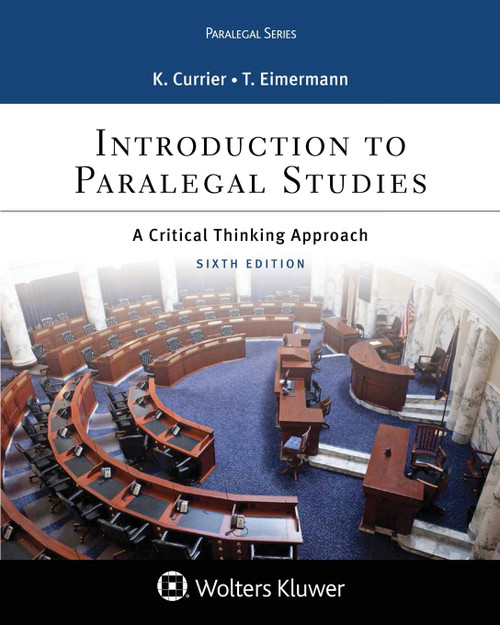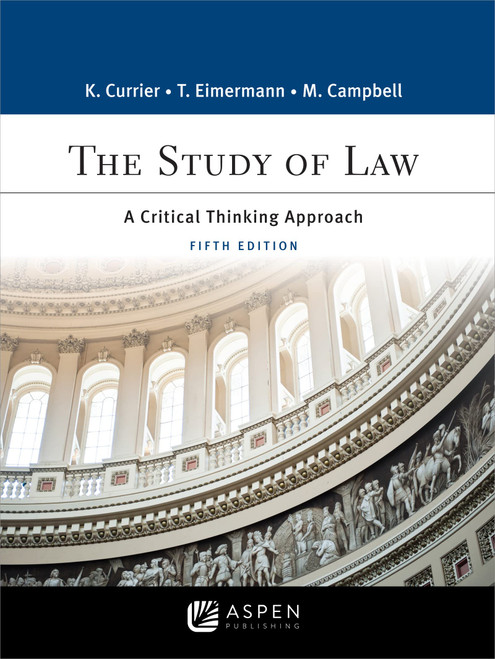* LOISLAW Packaged with 4 months free access to Loislaw's online legal research database.
* BLACKBOARD Available in Blackboard online course format.
* COMPANION WEBSITE www.aspenlawschool.com/currier_introtolaw4
( Contact your Aspen Representative for more information about these resources.)
Now in its fourth edition, the highly successful Introduction to Law for Paralegals continues to offer paralegal students and instructors a well-rounded and accessible introduction to the legal system, the paralegal’s role and the skills involved, as well as to substantive law issues.
Experienced authors and educators, Currier and Eimermann skillfully present their materials in a way that facilitates teaching and learning. This text offers
- A comprehensive, intelligent overview of all the key concepts covered in a typical introduction to law course
- A critical thinking approach that introduces students to the study of law and encourages them to interact with the materials through hypotheticals, examples, and well-designed questions
- Three parts that reflect the topics addressed in an introductory course: Part I, Paralegals and the American Legal System, introduces students to the role of the paralegal, sources and classification of law, the structure of the court system, and an overview of litigation. Part II, Finding and Analyzing the Law, offers an overview of the basics of legal analysis, research and writing. Part III, Legal Ethics and Substantive Law, covers substantive law
- The basic skills necessary to understand statutes and court cases
- Teaching and learning aids that include ethics alerts, marginal definitions, Internet references, and legal reasoning exercises throughout the book. Material presented in an accessible and well-organized format
- Substantive law chapters that use edited cases to teach students how to read and analyze the law
- Appendices on good writing, citation, excerpts from the U.S. Constitution, Ethical Codes, and additional Net Notes.
Enhancements in the Fourth Edition include:
- reorganization of Chapter 6 on Litigation, making this material even easier to teach. The chapter now begins with a discussion of ADR and integrates the use of case studies
- New or expanded coverage of: federal powers and preemption, judicial selection, domain names , electronic discovery, email, contingency fees, intentional interference with a contractual relationship, caps on damages, interpretation of contracts, eminent domain, collaborative divorces, sperm & egg donations, same-sex unions, sentencing guidelines, habeas corpus, and citing of unpublished opinions.
- Discussion of recently decided high-interest cases including Parents Involved in Community Schools v. Seattle School Dist. (use of racial criteria in school assignments), Phillip Morris v. Williams (punitive damages), Ledbetter v. Goodyear Tire (statute of limitations for employment discrimination claims), Scott v. Harris (police use of excessive force), Hudson v. Michigan (exclusionary rule), Brendlin v. California (sentencing guidelines), Bowles v. Russell (habeas corpus in death penalty cases), Hamdan v. Rumsfeld (habeas corpus in terrorism cases), and Rumsfeld v. Padilla (habeas corpus in terrorism cases)


 Introduction to Law for Paralegals: A Critical Thinking Approach [Connected eBook](Aspen Paralegal)](https://cdn11.bigcommerce.com/s-rr0pkl7rnl/images/stencil/500x659/products/50272/99988/81LzVpLGBoL__18942.1706207680.jpg?c=1)







